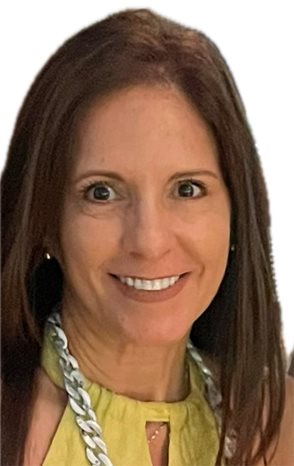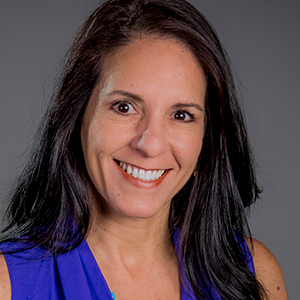Pursuing the call to change
I fell in love with research the day that I began working on my undergraduate research project. I had a mentor, designed experiments, set goals, learned to troubleshoot, developed new skills and had a new challenge every day. I enjoyed every aspect of the experience and aspired to do research forever, but after getting my master's degree I saw the end of this career path at home in Venezuela
I had an overwhelming desire to go to graduate school to continue studying biochemistry after I graduated, but a wall separated me from my future. Like the families of many first-generation college graduates, mine didn’t have resources.

For two years, I applied to a scholarship program in Venezuela. Each year, after many examinations, I made it to a final interview that was in English. However, I did not speak English and failed this last test.
I ultimately applied to U.S. graduate schools directly and joined the Ph.D. program of the State University of New York Upstate Medical University in 1992. This was the first time I traveled outside my home country and was away from my family. The moment I woke up on my first day in Syracuse, I realized that I had finally arrived, and I was afraid. I was alone in an unfamiliar culture where everyone spoke a different language. However, I then envisioned the future — a future where I could move forward doing biochemistry research and discovery — and started the day. I felt reborn.
The ensuing three decades have been both challenging and highly rewarding. I have experienced being half of a dual-career couple, an underrepresented minority woman, an immigrant and a caregiver — all while working as a scientist. I have taken unexpected turns and directions, reinventing myself a few times.
Early in my career, I wished to be a researcher in the private sector. I had a family, however, and that constrained me geographically, so I accepted a lecturer position at a liberal arts college. I found undergraduate classroom instruction rewarding, and connecting with the students energized me.
I joined the faculty of Ball State University, a primarily undergraduate institution, with the purpose of motivating students to pursue advanced research degrees. For six years, I taught and mentored students in my research laboratory. Many of them now hold faculty positions and practice medicine, which gives me great satisfaction. However, the demands of this position narrowed the scope of my opportunities to build a research program, and I wanted a position in a more research-intense environment. I found this at the University of New Mexico School of Medicine, where I moved in 2007. After five years, I was appointed chair of the department. Being a chair has expanded my academic visual field, showing me how things look from 30,000 feet. Notwithstanding, it has come at the expense of my own research program's productivity.
The COVID-19 pandemic was a time for me to reflect on my values. I wanted to do something less focused on myself, with the goal of helping people in meaningful new ways. I subsequently joined the ASBMB WIBMB Committee to help women in science navigate career challenges.
Although I was still working full-time and caring for a family, I also pursued and earned my executive MBA degree. Formal training on business management and administration was a logical direction, given that I enjoy the high-impact aspects of being department chair.
The past two years have been demanding, but worthwhile. I have refocused with a new purpose and the means to have a broader impact helping people to thrive. Looking ahead, I’ll continue to embrace new directions as I did that first cold morning in Syracuse, envisioning the future and enjoying the ride.
Career reinvention and reinvigoration: four stories
To mark Women’s History Month, four members of the American Society for Biochemistry and Molecular Biology’s Women in Biochemistry and Molecular Biology Committee, known as the WIBMB, have written personal essays about their career journeys.
Read them all:
Pursuing the call to change by Karlett Parra
Catalyzing change and redefining purpose by Sudha Sharma
Building community by Megan Filbin
The power of sabbaticals by Nicholas Rhind
Enjoy reading ASBMB Today?
Become a member to receive the print edition four times a year and the digital edition monthly.
Learn moreFeatured jobs
from the ASBMB career center
Get the latest from ASBMB Today
Enter your email address, and we’ll send you a weekly email with recent articles, interviews and more.
Latest in Careers
Careers highlights or most popular articles

Upcoming opportunities
ASBMB's PROLAB award helps graduate students and postdoctoral fellows spend up to six months in U.S. or Canadian labs.

From humble beginnings to unlocking lysosomal secrets
Monther Abu–Remaileh will receive the ASBMB’s 2026 Walter A. Shaw Young Investigator Award in Lipid Research at the ASBMB Annual Meeting, March 7-10 in Washington, D.C.

Chemistry meets biology to thwart parasites
Margaret Phillips will receive the Alice and C. C. Wang Award in Molecular Parasitology at the ASBMB Annual Meeting, March 7-10 in Washington, D.C.

Decoding how bacteria flip host’s molecular switches
Kim Orth will receive the Earl and Thressa Stadtman Distinguished Scientists Award at the ASBMB Annual Meeting, March 7–10, just outside of Washington, D.C.

Defining JNKs: Targets for drug discovery
Roger Davis will receive the Bert and Natalie Vallee Award in Biomedical Science at the ASBMB Annual Meeting, March 7–10, just outside of Washington, D.C.

Upcoming opportunities
No matter where you are in your career and what future path you aspire to, everyone needs leadership skills. Join ASBMB for practical strategies for building and practicing leadership skills.

